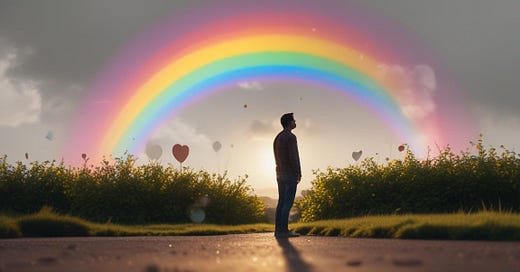Why Do I Have to Keep Coming Out?
Why do queer people have to come out, again and again, to everyone they meet? It’s a question I’ve grappled with for years. I once had a former friend—emphasis on former—who was legitimately offended that I hadn’t come out to her. She made me feel bad for staying in the closet and not telling her sooner. Years later, I came to realize that was a huge red flag and that our friendship was toxic—but that’s a tangent.
Other than myself, the first person I ever “came out” to was one of my best friends, Laurel. I remember the moment vividly. I was an insecure sophomore in undergrad (late bloomer, I know), coming to terms with my sexuality. For the longest time, I thought I was asexual because, in my middle school and high school days, I always felt a bit different but wasn’t really attracted to anyone.
One night, Laurel and I went on a fro-yo run to Sweet Alley in Isla Vista, near her house. We chowed down on our yogurt and then wandered over to the oceanside, eventually finding ourselves at a stairwell leading down to the beach. The words just flowed out of me. I wasn’t sure what to expect—I’m almost positive I gave the “asexual, bisexual, gay” dance of words—but much to my surprise, her face read, “I already know, and I still love you!”
That moment felt monumental, like a one-off experience. You come out, you’re done, and everyone just knows. Right?
Turns out, that wasn’t the case. Not even close.
The Myth of the One-Time Coming Out
I used to think coming out was a one-time thing—a grand reveal, after which your sexual orientation would be known to everyone. I wish I lived in a world where that were true. Or rather, a world where coming out wasn’t even necessary. But that’s not the reality.
Among my closest family and friends, I never had a formal “coming out,” except for my Nonni, which I wrote about here.
Each experience was personal and individual—or, quite honestly, 99% of people claimed to know before I even did. Who was I fooling?
The truth is, showing your true colors, revealing your sexual orientation, is an ongoing process. You meet new people all the time. You start a new job, travel to a new country, make new friends. You’re constantly discovering new places and people who don’t know everything about you. And that’s okay.
What I didn’t expect was how exhausting it would be. Coming out isn’t just one conversation; it’s a lifetime of conversations, explanations, and moments where you have to “let people know.” And while I’m grateful to live in a time where I can, for the most part, love freely and pursue my relationship without fear of persecution, it’s not always smooth sailing.
It’s an ongoing journey, one that sometimes feels like navigating a series of doors, each one requiring the same key—an explanation, an announcement, a coming out.
Kurt Hummel and the Power of Visibility
I remember the first time I saw Kurt Hummel on Glee. I was shocked—stunned, really—that someone so openly, unabashedly gay could be on television. It wasn’t just that he was there; it was that he was strong, confident, and unapologetic. Growing up, I didn’t understand just how brave and iconic that was. But now, I do.
Kurt made me realize that visibility matters, that being yourself—out loud and on screen—was something to be proud of. His presence on TV didn’t just normalize being gay; it made an impact on an entire generation, consciously or not. It certainly left a mark on me, and I’m amazed at the visibility on screen that has come to be as a result of that bravery.
Letting People In vs. Coming Out
A few years ago, I was watching Queer Eye, and Karamo Brown, group therapist of the Fab Five, said something that hit me right in the heart. He said, “You are letting people in, rather than coming out.” I love that energy—the idea that this is my story to share, on my terms, when and how I choose.
How profound.
I’ve come to realize that this whole idea of coming out isn’t one-size-fits-all. It’s not about broadcasting who you are to the world; it’s about letting people into the deepest, truest parts of yourself. It’s about opening the door, rather than feeling pushed through it.
Amen.







It must be a constant challenge. I never thought about this before. That means you are brave to let people in each time that happens.
I love the idea of letting people in rather than coming out. I have to say it's how I feel now most of the time. It's more of a decision for me of "do I trust that person enough to let them know or not". If not, I don't feel bad anymore for not correcting them about the gender of my partner. It's ok to not want to put yourself in unnecessary risky situations sometimes.
Anyway, lovely post ❤️